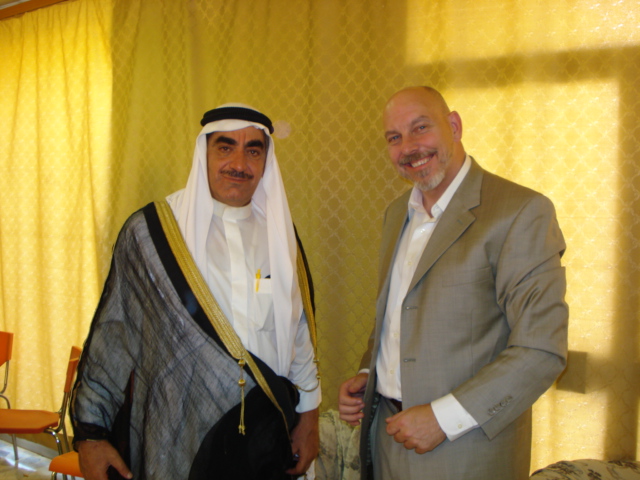
When Robert E. Lee surrendered the Army of Northern Virginia at Appomattox, the erstwhile rebels went home. Officers kept their private side arms and horses and nobody was persecuted for what happened during the war. These generous terms were part of the reason that the bloodiest war in American history did not result in permanent hatred or discord. April 1865 was the month that saved America. Such a result is rare in the history of the world. We should take the lesson.
We went up to Al Qaim for a “reconciliations event” with local leaders and Sheiks. Some people in the late insurgency were/are evil terrorists, but others were/are “legitimate” fighters who fought on the wrong side. There are two options for them. You can hunt down and eliminate the enemy by killing them or imprisoning them, or you can eliminate the enemy by reconciling them with society. There is a time and place for each strategy. Reconciliation gives hope to all sides and by seeking and accepting reconciliation the former insurgent recognizes the legitimacy of the societal structures he raised his hand against and now wants to reenter as a productive member.
In W. Al Anbar, the tribes (within the law) decide who can be brought back and who stays in the desert, whether of not the things the person has done are beyond the pale or if they can be forgiven. The tribal leaders vouch for their prodigal members and get the agreements of leaders from other tribes. Since tribes are very much like extended families, the reconciliation is also among the members who may have had what amounts to a blood feud based on the transgressions of particular tribal members. Essentially the Hatfields and McCoys need to accept that further revenge is inappropriate.
We Americans can watch it happen, but it is not our process. It clearly is based on traditions that go back thousands of years. But we can see from our own history (I mentioned above) the usefulness of ending bloodletting by avoiding more of the same.
The 1865 analogy is good, but it was not mine w/o prompting The leading Sheik of Al Qaim told me that he had studied American history as a young man. He was especially interested in our civil war and how it ended. Beyond that, he spoke passionately for a united Iraq and asked me to be sure that Americans understood the history of the place. He was upset that some in America were calling for a partition of his country, which he said was unnecessary and ultimately unworkable. I asked about a more federal state, reminding him what he already knew, that the U.S. was a federal country with strong local autonomy. I was surprised that he had little faith in the efficacy of local institutions in Iraq, even though he and his Anbari colleagues had clearly shown that they could lead the way toward a more peaceful Iraq through their local initiatives and had succeeded BEFORE and the central authorities.
The Sheik told me that Iraq was not like the U.S. and that it needed a stronger hand and more centralization because the people of Iraq had little experience with anything else. I disagree with his conclusions (although I certainly did not presume to dispute with him the history of his own country). My perspective might be the triumph of hope over experience, but his is the dominance of past experience over hope for the future. Of course, I have to take his opinion very seriously. Not only does he have the knowledge of the country that I could never attain, he also has power to influence the future of Iraq, and so his opinion is more than an academic construction.
We also talked about Iranian influence and the long history of Persia trying to dominate Mesopotamia, but I will not go into specific detail. Suffice to say, he was against it and blamed nefarious Iranian influence for many of Iraq’s current tribulations.
As a practical matter all this changes little in what either of us will be doing in the near term. We are both seeking to strengthen local institutions, improve the local economy and set Al Anbar on the road to a better future. The bigger issues will certainly be decided above my pay grade and probably even above his. Still, I will think hard about what this thoughtful man told me about his country and when I meet him again I hope to have better questions to ask.
